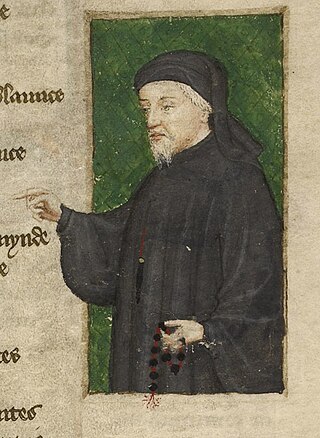Related Research Articles

Geoffrey Chaucer was an English poet, author, and civil servant best known for The Canterbury Tales. He has been called the "father of English literature", or, alternatively, the "father of English poetry". He was the first writer to be buried in what has since come to be called Poets' Corner, in Westminster Abbey. Chaucer also gained fame as a philosopher and astronomer, composing the scientific A Treatise on the Astrolabe for his 10-year-old son Lewis. He maintained a career in the civil service as a bureaucrat, courtier, diplomat, and member of parliament.
Lee is a common surname in English-speaking countries.
Shevchenko is a family name of Ukrainian origin. It is derived from the Ukrainian word shvets, literally meaning "cobbler or shoemaker", and the suffix -enko, denoting Ukrainian descent. It is somewhat equivalent to occupational surnames: French: Cordonnier, Italian: Crispino, Spanish: Zapatero, German: Schumacher, Schumann, Schubert, and English: Shoemaker, Shoesmith, also Laster.

Pity is a sympathetic sorrow evoked by the suffering of others. The word is comparable to compassion, condolence, or empathy. It derives from the Latin pietas. Self-pity is pity directed towards oneself.
Souter is a Scottish surname derived from the Scots language term for a shoemaker. Notable people with the surname include:
DeSutter is a surname derived from the Latin word sutor (shoemaker) and is widely used in Flanders. One could translate DeSutter as 'The Shoemaker'. The first record of the name is from the 13th century in Flanders. DeSutters originated in the northernwestern parts of Belgium in the Ghent area near the English Channel, as well as in Northwestern France. Variants include De Sutter, DeSoto, DeZuter, DeZutter and De Zutter.
Large is an English surname, with variants including Lardge and Lurge. Its meaning is variable, though it may derive from the Norman French adjective, large, as it is found in the surname "le Large" in English records dating back as far as the 13th century. Harrison's work on English surnames gives the following: "Large Big; Generous [Middle English Old French large; Latin larg-us, -a, [meaning] abundant, liberal]"
Butt is a German and an English surname whose origins lie in the South West peninsula region of England.
Jenkins is a surname that originated in Cornwall, but came to be popular in southern Wales. The name "Jenkin" originally meant "little John" or "son of John". The "kin" portion is of Dutch or Danish origin (-kijn), which then gained a certain popularity in England.
Duvall is a French surname and an alternative spelling of "Duval", which literally translates from French to English as "of the valley". It derives from the Norman "Devall", which has both English and French ties. Variant spellings include: Davolls, Deavall, DeVile, Devill, Deville, Divall, Divell and Evill. Its meaning is derived from the French town of Déville, Seine-Inferieure. The spelling, "Devall", was first recorded in England in the Domesday Book.
The surname Pole usually derives from "Pool", a person associated with a body of water.
Szewczyk is a Polish occupational surname, derived from the occupation of szewc ("shoemaker"). It is related to the Czech name Ševčík and Ukrainian surname Shevchik (Шевчик) and Shevchuk (Шевчук).
Pigot is an English surname.
Trump is a surname of English and German origin:
Sapozhnikov or Sapozhnikova is a Russian surname, derived from the Russian word "сапожник" (cobbler/shoemaker/bootmaker). Notable people with the surname include:
Shevtsov is a Russian-language surname derived either from the Russian word швец for "tailor" or from the Ukrainian term швець for "cobbler/shoemaker", literally meaning "child of tailor/cobbler".
Cordonnier is a French-language occupational surname literally meaning "shoemaker". From Old Fr. cordouanier (cordonnier), a cordwainer, a worker in Cuir de Cordoue, literally meaning "leather from Córdoba"
The surname Courvoisier or de Courvoisier is in origin a French word, meaning 'shoemaker'. The word comes from Old French courveis ('leather') which itself comes from the Latin word Cordubense meaning 'from Cordova', originally referring to a kind of leather associated with that city.
The surnames: Cizmar/Cismar/Chizmar/Chismar (English), Čižmár/Čižmárova (f.) (Slovak), Čižmář/Čižmárová (f.) (Czech), Ciżmar (Polish), Čizmar (Serbian), Čizmar/Čižmar (Croatian), Csizmar (Hungarian), Čižman (Slovenian), Cizmar/Cismar/Cismaru (Romanian) and Cizmar/Cismar/Zhishman (German) have two possible origins:
Kerner is an occupational surname of German and Jewish (Ashkenazic) origin. There are various possible derivations, including as a name for a farmer or a nickname for a small person, from an Middle High German kerne ; German Kern or Yiddish kern (grain), among others. Middle English kerner is a variant of cherner. It may also derive from "carter" or "carrier", from the German word kerenere. The name was found in Bavaria, Germany, in the medieval period.
